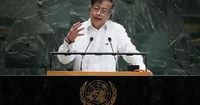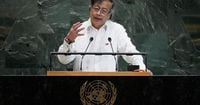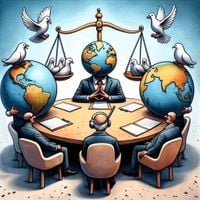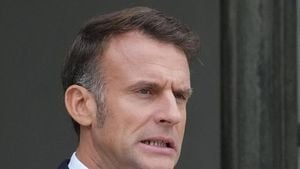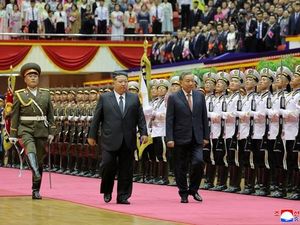On October 9, 2025, Colombian President Gustavo Petro ignited diplomatic debate by publicly proposing that Qatar serve as a mediator to de-escalate mounting tensions between the United States and several Caribbean-bordering nations, including Colombia and Venezuela. The call for mediation comes in the wake of a series of controversial U.S. military strikes on small boats in international waters off Venezuela—actions the U.S. claims are part of a broader anti-drug trafficking campaign, but which Petro and other regional leaders have sharply criticized as excessive and dangerous.
Petro’s statements, made during a trip to Brussels and amplified on his social media account, reflect a growing unease in South America regarding Washington’s increasingly forceful approach to combating drug trafficking in the Caribbean. According to the Associated Press, Petro argued that Qatar—a nation with a proven track record in mediating complex international conflicts—could help persuade the U.S. to “cease the aggression with missiles” in the region. He described the American strategy as a “missile policy” that targets “poor youth” in the Caribbean, a policy he contends fosters repression, extrajudicial violence, and risks pushing the region toward broader conflict.
The backdrop to Petro’s proposal is fraught with tension. The Trump administration has reported the destruction of four small boats in the Caribbean, all allegedly carrying drugs. The most recent incident, announced by U.S. Defense Secretary Pete Hegseth on October 3, resulted in the deaths of four men. While the U.S. said the strike targeted known drug traffickers, Petro suggested—without offering evidence—that Colombian nationals may have been among the dead. This claim was promptly disputed by a White House official, who told the AP that the U.S. wants Petro to publicly retract the statement, calling it baseless.
Petro’s criticism of U.S. tactics was uncompromising. He labeled the use of lethal force “disproportionate” and described the deaths as “murder,” insisting that drug interdiction should focus on capturing suspects rather than killing them. As quoted in ColombiaOne, Petro wrote, “I support the proposal that Qatar mediate between the Caribbean and the United States to change the policy of launching missiles at poor Caribbean youth, which leads only to killing.” He further argued that the only effective way to dismantle drug trafficking organizations is through negotiation, not militarization.
The Colombian president’s proposal is not limited to the U.S. military presence. He has also asked Qatar to mediate in Colombia’s own internal conflict with major drug trafficking groups, specifically the Gulf Clan and the Conquistadors of the Sierra. According to ColombiaOne, Petro stated, “As president of Colombia, I have requested not only that Qatar mediate with the Gulf Clan and deactivate the main drug trafficking organization in the Caribbean, but also its rival group, the ‘Conquistadors of the Sierra.’ Almost all the cocaine that leaves Colombia through the Caribbean comes from these two groups.”
This diplomatic outreach is not entirely unprecedented. In September 2025, Colombia completed its first round of peace talks with the Gulf Clan in Qatar, signaling a willingness to experiment with alternative approaches to the drug war. The choice of Qatar as mediator is strategic. The Gulf state has built a reputation as a neutral and effective interlocutor in conflicts ranging from Afghanistan to Sudan, and it maintains diplomatic relations with a diverse array of state and non-state actors. For Petro, Qatar’s international credibility and independence from traditional geopolitical pressures make it an ideal partner for this delicate mission.
Petro’s proposal comes at a time when the U.S. has dramatically increased its military footprint in the Caribbean. According to The New York Times and regional media, Washington has deployed up to 10,000 troops to Puerto Rico, supported by ships, submarines, and aircraft, all under the banner of anti-drug operations. But for Colombia—and other governments in the region—this surge is seen less as a solution and more as a threat to Caribbean sovereignty. Petro and his allies argue that these operations disproportionately harm marginalized communities, with young people in Caribbean islands often paying the highest price for military actions.
The U.S. administration, for its part, has been steadfast in its approach. President Donald Trump has told lawmakers that he considers drug traffickers to be unlawful combatants, justifying the use of military force against them. In the most recent boat strike, U.S. intelligence identified the four killed men as drug traffickers. The White House, while rejecting Petro’s claims about Colombian casualties, emphasized that Colombia remains an essential strategic partner, and that the U.S. is committed to cooperation on shared priorities, as reported by the AP and the BBC.
The diplomatic landscape has grown more complex with the involvement of other international actors. The Saudi president has expressed support for Qatari mediation between Venezuela and the U.S., signaling a potential shift in the region’s diplomatic dynamics. However, the U.S. has already rejected Qatar’s offer to mediate in the Caribbean, raising questions about whether Doha will risk its relationship with Washington by persisting in its efforts.
Within Colombia, Petro’s overture to Qatar has sparked debate. Some opposition figures question whether inviting an external mediator undermines national sovereignty or risks agreements that cannot be enforced. Others, particularly those aligned with the government, argue that traditional militarized approaches have failed and that innovative, diplomatic solutions are urgently needed. The outcome of this strategy, observers say, could set a precedent for future efforts to combat organized crime—not just in Colombia, but across the region.
Meanwhile, Venezuelan President Nicolás Maduro has sought his own form of mediation, sending a letter to Pope Leo XIV to help maintain peace in his country. Maduro has consistently denied that Venezuela is a major player in the drug trade, further complicating the regional narrative.
As the world watches, the stakes are high. If Qatari mediation leads to tangible progress—such as reduced violence along drug routes or successful disarmament agreements—Colombia could pave the way for a new paradigm in the fight against organized crime. But if the effort falters, critics may seize on it as evidence of diplomatic naïveté or state weakness. For now, the region waits to see whether dialogue can succeed where decades of force have not.
